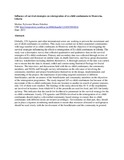| dc.description.abstract | Globally, UN Agencies and other international actors are working to prevent the recruitment and use of child combatants in conflicts. This study was carried out in three populated communities with large number of ex-child combatants in Monrovia with the objective of investigating the survival strategies influencing the effective reintegration of Ex-child combatants in Liberia. The study was a descriptive survey that collected quantitative and qualitative data on the survival strategies of Ex-child combatants. Primary and secondary data was collected through review of past documents and literature on similar topic, in-depth interviews, and focus group discussions with key stakeholders including children themselves. A thorough analysis of the data was carried out to ensure that the data is cleaned, coded and concise using Statistical Package for Social Sciences.
The interviews and discussions held with the ex-child combatants, the community members, and NGOs staff brought out key information on the relevance of involving the community members and project beneficiaries themselves in the design, implementation and monitoring of the project; the importance of providing targeted assistance to different beneficiaries; and the awareness of the beneficiaries and community members on the objectives of the reintegration programme.. The study targeted 165 ex-child combatants but because of the movement of the ex-child combatants from one location to another in search of greener pastures, only 116 of them were reached. The findings of the study showed that 41 % of the respondents are involved in business from which 64 % of the proceeds are used for food, and 16% for family up keep.
This indicates that the search for livelihood is paramount in the survival strategy for the ex-child combatants. Lastly, UN agencies and INGOs involved in the reintegration of ex-child combatants should employ a diversified community based strategy to ensure that ex-child combatants with different needs are treated accordingly. Governments on their part, they should put in place a rigorous monitoring mechanism to ensure that resources allocated to such projects should be used wisely with the involvement of the beneficiaries and the community in general. | en_US |

